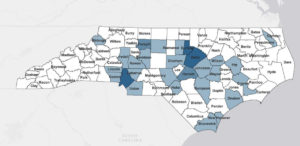DUKE COVID19 DIGITAL LAB, A SSRI PARTNERSHIP WITH DUKE FORGE
 The Duke Forge/Duke University Social Science Research Institute (SSRI) COVID19 Digital Lab commissioned a survey that was conducted by Clarity+Campaign Labs (CCL) from March 29-31, 2020. The survey was designed to ask North Carolinians (N=1,274) about their social distancing behavior in response to the ongoing coronavirus disease (COVID19) pandemic.
The Duke Forge/Duke University Social Science Research Institute (SSRI) COVID19 Digital Lab commissioned a survey that was conducted by Clarity+Campaign Labs (CCL) from March 29-31, 2020. The survey was designed to ask North Carolinians (N=1,274) about their social distancing behavior in response to the ongoing coronavirus disease (COVID19) pandemic.
The survey asked respondents about their behavior in the week prior to being surveyed by telephone (landline and cellphone). For this reason, this initial survey provides insight into behaviors prior to the statewide “Stay at Home” order issued by Governor Cooper that took effect at 5:00 pm on March 30, 2020.
Full details of the survey methodology, the questionnaire instrument, and the data may be accessed and freely used.
The survey will be repeated weekly and results updated in order to track any changes in self-reported behavior that may influence the transmission of the SARS-CoV-2 virus.
Summary of Results
Two-thirds of respondents said that they have made large changes to their routine due to the coronavirus, while six percent said that had made no real changes. Respondents were evenly split (49% vs 50%) in having a household member who left the household in the previous 3 days to go to work; most of the response period was before the statewide stay at home order was issued. Nearly all respondents answered affirmatively to the question “Are you currently practicing social distancing?” (97% yes vs. 3% no), but when asked about specific behaviors, a substantial proportion of respondents reported behavior that could spread the SARS-COV-2 virus that causes COVID19. Two percent of respondents reported being sick (responded affirmatively to the question: Do you feel sick today with any flu-like symptoms such as cough, fever and aches?). Forty percent of respondents reported at least one child (<18 years of age) living in the household, and 17 percent of those reported that their children interacted with other children (school or play dates) from outside the household in the past 24 hours.
Survey Response Details
Other specific measures related to potential exposure to the SARS-COV-2 virus show substantial variation:

Question: About how many people that do not live in your household have you had physical, face-to-face interactions with in the past 24 hours?
| None | 36% |
| 1-3 | 33% |
| 4-6 | 11% |
| 7+ | 9% |
Question: How many of those interactions were you able to stay at least 6 feet from the other person at all times? (Six feet is just far enough that if you and the other person both reached out your arms, you couldn’t touch one another.)
| None | 21% |
| 1-3 | 45% |
| 4-6 | 16% |
| 7+ | 19% |
Question: In the last week, how many times did you spend time in a group of more than 20 people?
| None | 78% |
| 1-3 | 15% |
| 4-6 | 2% |
| 7+ | 5% |
Question: Approximately how many times, if at all, did you wash your hands in the past 24 hours? (Your best guess is fine.)
| None | 0% |
| 1-3 | 4% |
| 4-6 | 18% |
| 7+ | 77% |
Several questions provide the respondents views about their personal risk of contracting the coronavirus, and their view of how most North Carolinians are responding to the current pandemic:

Question: Do you think it’s likely that you’ll get the coronavirus, also known as COVID-19?
| Likely | 13% |
| Not likely | 57% |
| Unsure | 30% |
Question: How would you describe the way most North Carolinians are dealing with the coronavirus outbreak? Would you say that most North Carolinians are underestimating the risk, reacting appropriately, or overreacting?
| Underestimating risk | 38% |
| Reacting appropriately | 52% |
| Overreacting | 9% |
Additional Resources and Information
- Survey instrument
- Source code and data are available on GitHub
- Survey codebook for Week 1 (March 29-31)
Contact Information
For questions about this survey and associated data, please contact: Don Taylor, Director of the Social Science Research Institute
